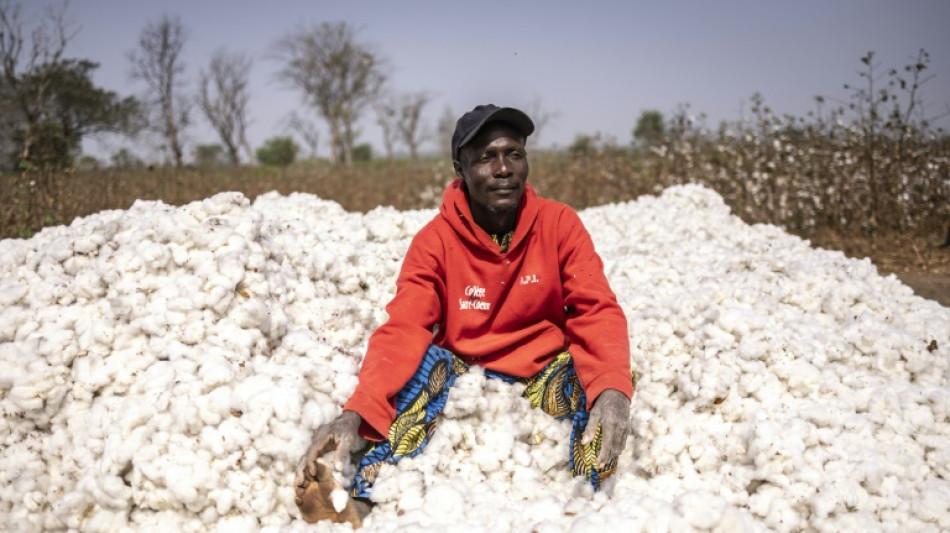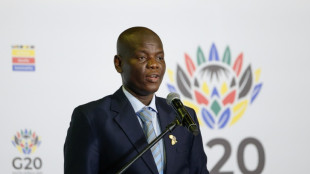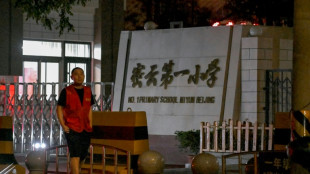
-
 Combs created 'climate of fear' as head of criminal ring: prosecutors
Combs created 'climate of fear' as head of criminal ring: prosecutors
-
Chelsea's Fernandez flying ahead of Benfica reunion at Club World Cup

-
 Potgieter and Roy share PGA lead in Detroit with course record 62s
Potgieter and Roy share PGA lead in Detroit with course record 62s
-
City skipper Bernardo hails Guardiola's new generation

-
 Nike profits sink but company says it is turning a corner
Nike profits sink but company says it is turning a corner
-
'Mission: Impossible' composer Lalo Schifrin dies aged 93

-
 Ex-Ravens ace Tucker suspended 10 games over masseuse allegations
Ex-Ravens ace Tucker suspended 10 games over masseuse allegations
-
Australia lead by 82 runs as West Indies' Test on a knife edge

-
 Snow cloaks Atacama, the world's driest desert
Snow cloaks Atacama, the world's driest desert
-
Man City crush Juve as Real Madrid aim to avoid them

-
 Dryburgh and Porter grab lead at LPGA pairs event
Dryburgh and Porter grab lead at LPGA pairs event
-
Iran says no plan for new US nuclear talks, plays down impact of strikes

-
 City thrash Juventus to maintain 100% record at Club World Cup
City thrash Juventus to maintain 100% record at Club World Cup
-
Brazil prodigy Estevao has unfinished business ahead of Chelsea move

-
 Mexican lawmakers vote to ban dolphin shows
Mexican lawmakers vote to ban dolphin shows
-
Trump admin insists Iran strikes success, attacks media

-
 Anna Wintour steps down as US Vogue editor after nearly 40 years
Anna Wintour steps down as US Vogue editor after nearly 40 years
-
How Trump finally learned to love NATO -- for now

-
 Faith Kipyegon misses out on bid for first female sub-4 minute mile
Faith Kipyegon misses out on bid for first female sub-4 minute mile
-
Spain PM alleges 'genocide' in Gaza as rescuers say 65 killed

-
 Fritz wins twice in one day to step up Eastbourne title defence
Fritz wins twice in one day to step up Eastbourne title defence
-
St. Bernards romp at unique Swiss theme park

-
 RFK Jr panel votes against ingredient targeted by anti-vaxxers
RFK Jr panel votes against ingredient targeted by anti-vaxxers
-
Anna Wintour steps down as editor of US Vogue after nearly 40 years

-
 Sean 'Diddy' Combs used 'power, violence and fear': prosecutor
Sean 'Diddy' Combs used 'power, violence and fear': prosecutor
-
Irish legend O'Mahony to lead BaaBaas in South Africa

-
 In-form Russell ready to get his elbows out against Verstappen
In-form Russell ready to get his elbows out against Verstappen
-
G20 president S.Africa warns global turmoil hurts poorer nations

-
 Chase and Hope steady as West Indies eye lead over Australia
Chase and Hope steady as West Indies eye lead over Australia
-
McLaren tell Piastri and Norris to carry on racing

-
 Champion jockey Oisin Murphy charged with drink driving
Champion jockey Oisin Murphy charged with drink driving
-
Iran strikes damage hard to assess under Israeli military censorship

-
 Argentina to try 10 in absentia over 1994 bombing of Jewish center
Argentina to try 10 in absentia over 1994 bombing of Jewish center
-
Spain court suspends huge Ryanair 'abusive practices' fine

-
 Top US court allows states to defund largest abortion provider
Top US court allows states to defund largest abortion provider
-
Nigeria's Tinubu signs major tax overhaul

-
 COP30 to be held in Amazonian city despite accommodation concerns: CEO
COP30 to be held in Amazonian city despite accommodation concerns: CEO
-
Netanyahu seeks to postpone trial summons after Trump backing

-
 South Africa's Sundowns make impact felt at Club World Cup
South Africa's Sundowns make impact felt at Club World Cup
-
Frenchman who robbed Kim Kardashian dies of cancer aged 69

-
 Vehicle hits pedestrians near primary school in Beijing
Vehicle hits pedestrians near primary school in Beijing
-
After NATO deal, how far will EU go for trade peace with Trump?

-
 Pentagon chief backs Trump on success of Iran strikes
Pentagon chief backs Trump on success of Iran strikes
-
Mbappe files harassment complaint against PSG

-
 New chief Coventry says IOC will launch gender working group
New chief Coventry says IOC will launch gender working group
-
US panel replaced under Trump backs new shot for kids

-
 Roblox's Grow a Garden explodes online video game numbers
Roblox's Grow a Garden explodes online video game numbers
-
Bezos wedding festivities kick off in Venice

-
 US stocks rise, dollar slides as Trump eyes new Fed boss
US stocks rise, dollar slides as Trump eyes new Fed boss
-
Europe court condemns France over police racial profiling


Benin seeks home-grown cotton 'revolution'
Mathias Azonnoudo, a 50-year-old farmer in Benin, was taking a break sitting on a large pile of freshly picked cotton, which the government hopes will feed the country's nascent textile revolution.
Azonnoudo and other farmers in the West African country have benefited from a recent uptick in demand for cotton, with the government seeking to launch a "Made in Benin" clothing industry.
"I feel like the government has found business leaders that want more, so they are encouraging farmers to produce more," said Azonnoudo, who has been growing cotton for the past 16 years.
Benin has long vied with Mali for the title of Africa's largest cotton producer, exporting mostly raw fibres for processing abroad to countries like Bangladesh or China, the world's largest garment exporters.
But it now wants to process more of its "white gold" locally, to boost production and exports of 100 percent Beninese clothing.
Benin is expected to produce 669,000 tonnes of cotton during the 2024-2025 season, according to data from the Regional Program for Integrated Cotton Production in Africa.
Mali meanwhile is set to produce 569,000 tonnes in the season.
Under the initiative of Benin's President Patrice Talon -- who made his fortune from cotton in the 1990s and 2000s, earning him the nickname "King of Cotton" -- authorities are racing to consolidate the nation's lead.
- 'All the infrastructure we need' -
Those ambitions came to life in 2020 with the creation of the Glo-Djigbe Industrial Zone (GDIZ), a vast manufacturing district 45 kilometres (30 miles) from the economic capital Cotonou in the south of the country.
Samples of the various clothing made locally are now on display in the zone's showroom, including shirts, trousers, dresses and military and police uniforms. It also produces towels and sheets.
The industrial park, financed as a partnership between the government and Indian businessman Gagan Gupta, offers spinning, weaving, dyeing and knitting facilities.
Last year, GDIZ exported its first items of clothing to the French brand Kiabi.
"We have all the infrastructure we need to process agricultural products," said Letondji Beheton, managing director of the company running GDIZ, adding that it worked with around 21,000 farmers throughout the country.
"Today at GDIZ, we transform 40,000 tonnes of cotton a year and produce between seven and 10 million garments a year," he said.
With three new garment manufacturing units in the pipeline, production in the industrial zone is expected to grow further by year-end.
- Trust the process -
Upon ascending to the president in 2016, Talon took a number of measures to support the cotton industry, in particular by giving more room to the private sector at the expense of state-owned companies.
Benin "now processes a third of its cotton," according to Nestor Adjovi Ahoyo, an agro-economist.
The transformation is mainly taking place at the GDIZ but also to a lesser extent at smaller businesses.
At Couleur Indigo, a clothing and jewelry brand in the coastal town of Ouidah, 50-year-old Nadia Adanle said she opened her boutique in 2007 to "contribute to the diversification of Beninese craftsmanship" and offer "an authentic, purely Beninese cotton product".
In the short term, Beninese authorities say they are aiming to process "50 percent of the cotton produced in Benin and export the remaining 50 percent", Adjovi Ahoyo said.
To achieve this, he said, Benin must increase production capacity and attract investors, especially foreigners.
For his part, Beheton at the GDIZ said that within five to six years the country will have "about 30 integrated textile units in the zone to process almost all" of Benin's cotton.
J.Saleh--SF-PST
